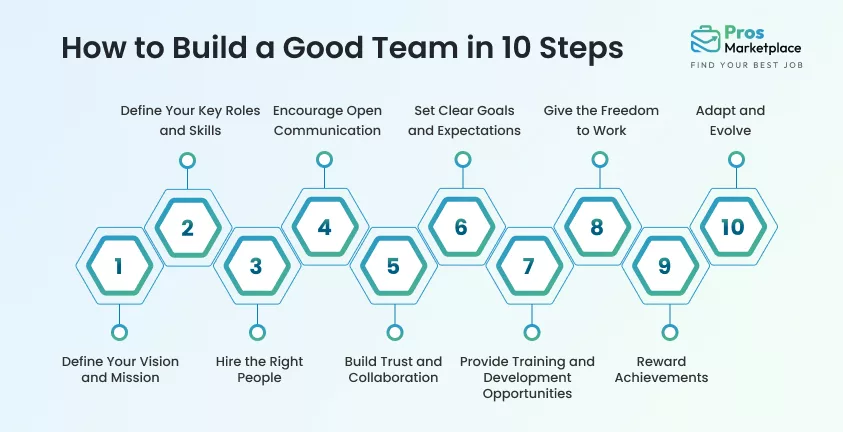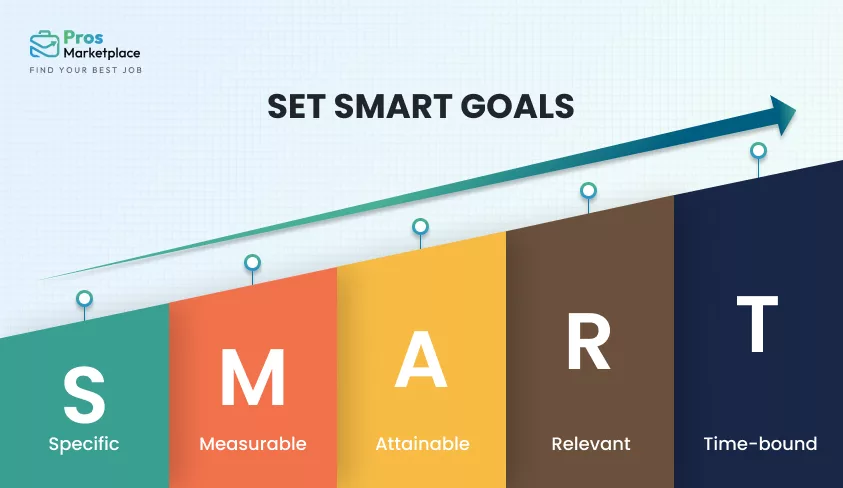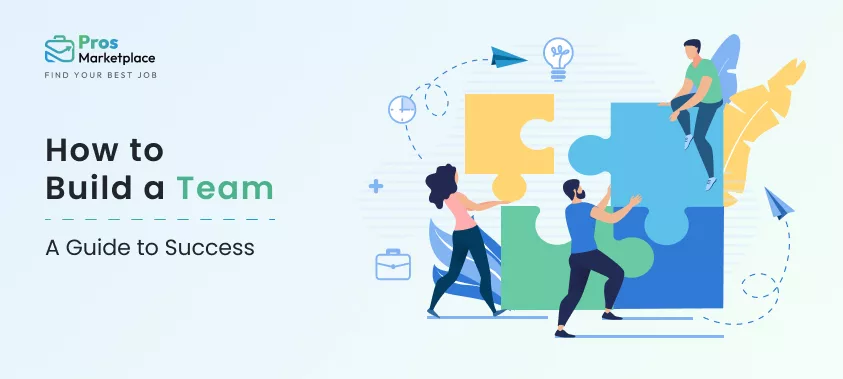Behind every successful company stands a team of committed people working towards a common goal. You might be either thinking of a new business or scaling up the already existing one.
Building up a solid team is important. But how? How can you build a team that not only works well together but drives success? The following blog post will walk you through the key elements of building a team and guide you on how to make a team support growth and achievement.
What Makes a Good Team?
Before talking about how to build a team, it’s very important to know what makes a good team in the first place. Any good team is not just a group of highly skilled individuals. A good team consists of people who complement each other, support each other, and work well together. Communication, trust, and shared vision are critical for that sort of team. A good team encourages and supports one another, works on finding cooperative solutions, and shares a common purpose.
When every individual in the team feels valued and knows his or her respective roles, they contribute positively to the overall success of the team. Synergistic effects help this entire group move toward the same goal and turn individual efforts into collective achievement.
10 Steps to Build a Good Team

A successful team is the backbone of every successful organization. Beyond just people working together, a good team works together toward a common goal, communicates effectively, and cares for one another in the workplace. Building an effective and strong team requires careful planning, efficacious leadership, and the right work environment. The following section explains 10 steps that help you establish a high-performance team.
Define Your Vision and Mission
What is the company’s mission that you want your team to achieve? This vision will become the guiding principle for your team because each member will understand why they work. When people know the reason for doing something, they’ll be much more motivated to put forth an effort.
Whether you’re starting from scratch or refreshing an existing team, a clear vision will both guide and inspire the group to move ahead.
Define Your Key Roles and Skills
Once you have a clear sense of your vision, you’ll want to outline the specific roles and skills that you need to succeed: exactly what kind of expertise do you need? Is it project management, technical skills, or customer service? Begin with a list of the essential roles for your team to succeed.
Knowing what skills are required will help you hire the right people. Building a team is like piecing together a puzzle, and each role is a vital piece. You want to make sure you have all the elements of your project or business covered so that everything goes smoothly.
Hire the Right People
Having identified key roles within the company, it is now time to fill these positions. Hiring, however, is not only about filling individual skills but also includes people who are in keeping with your company’s culture.
You want people who represent your values; they should understand where you’re headed and be able to really perform well in a team, communicate effectively, and consider things from a team-based perspective.
If you hire people with the best-in-the-job qualifications and great people who work well with others, then you are bound to be successful. Therefore, using platforms like Pros Marketplace can go a long way as they simplify the hiring process and connect you with the right talent.
Encourage Open Communication
A successful team communicates openly and frequently. Motivate your team members to voice their opinions, share their ideas, and discuss challenges. Regular meetings should be held where everyone can share their progress, ask questions, and propose solutions.
Listen and consider each member’s opinions and ideas to ensure that the members who feel heard are more engaged and proactive. Clear communication reduces misunderstandings and keeps the whole team moving the right way, thus making it easy to solve problems collectively.
Build Trust and Collaboration
A team can only be successful when built on the foundation of trust. In fact, in the absence of trust, it is very hard to build collaboration or set common goals. Encourage employees to support and appreciate the efforts made by another employee. Make an environment in which the goal is not competition but collaboration.
Though it takes time, the effort is very worth it. People share ideas when they trust one another, take more risks when they trust each other, and work towards common objectives. The more cohesive and trusting the team is, the easier it will be to overcome challenges and succeed.
Set Clear Goals and Expectations

Every member of the team must know what you expect them to be. Set clear goals for individual members as well as the overall group. Ensure the objectives are reachable and realistic but not so easy that no motivation is needed. Clear expectations help team members know what they are working toward and find ways of checking themselves and knowing where they are.
Defined milestones also create an avenue for the team to celebrate some achievements along the journey, and keeping everyone’s head in the game will help boost morale.
Provide Training and Development Opportunities
There’s never a time when you can say there is no room for growth, even if your team is so skilled. Training and professional development opportunities enable them to do better, not just because you believe their work is valuable but because you care about the growth in their abilities. Organize workshops, online courses, or mentorship programs to keep your teams’ skills fresh.
The more employees are engaged in continuous learning, the more attached they remain to the workplace. A team is not just a group of talented people; it is an investment in those people’s long-term success for the ultimate good of the business.
Give the Freedom to Work
Do not suffocate creativity and demotivate your team by micromanaging. Guide them, but let them decide independently, solve problems, take ownership of their work, and understand that you trust their judgment.
Empowered team members are most likely to innovate and develop effective solutions. Autonomy breeds responsibility, and people will produce better if they are responsible for what they are doing.
Reward Achievements
Appreciation brings happiness. Recognize the efforts of your team and reward the merit. It need not be necessarily a grand bonus or even public appreciation, but success celebrations keep the morale up, and the team continues to deliver performances.
This will build a healthy work culture through the periodical recognition of the efforts of individuals and groups. When the workforce feels valued, then they are more likely to be committed and continue working towards achieving the objectives of the company.
Adapt and Evolve
Adapt to changing circumstances by changing your team structure, hiring additional members, or changing strategies as needed.
Regularly review the performance of teams and make adjustments to ensure optimal performance. Flexibility will be what keeps your strong, successful teams going. Encourage your team to become open to change and new challenges as they arise. By becoming more responsive, your team will be better equipped for future growth.
Build a Winning Team with Pros Marketplace
Do you want to build a team that can take your business to success? Pros Marketplace is the right choice. We connect businesses with the best talent in the industry, ensuring you find the perfect fit for every role. Pros Marketplace simplifies the hiring and expansion process for you. Our platform gives access to hiring skilled individuals who share your vision with your company, ensuring the company will grow. With us, you can focus on developing a strong team, as we will connect you to talented workers in Latin America looking for remote work.
Conclusion
Building a new team or developing a new one represents a continued process. It is done by defining your goals and hiring the right people. You also have to work on building trust among them; and establishing open communication. A good team does not build overnight—it’s made, grown, and developed every day. Take your time and invest in the people around you; you’ll find that comes back in spades in better performance, higher innovation, and long-term success. Whether it is a small business or an expanding company, this is the right way to develop a great, successful team.







